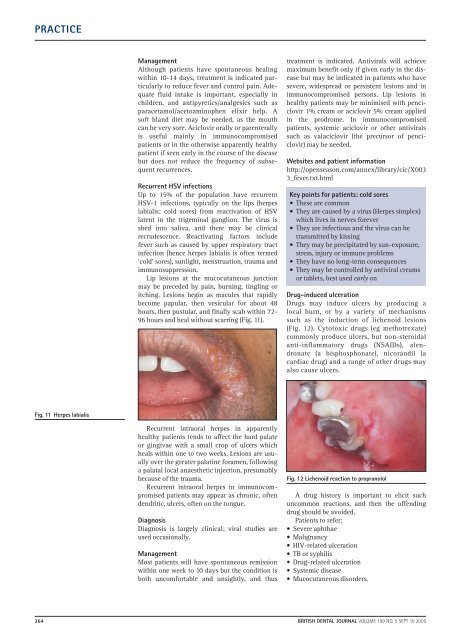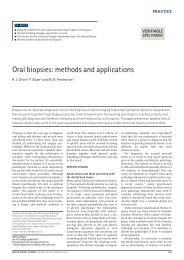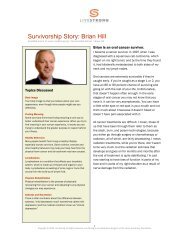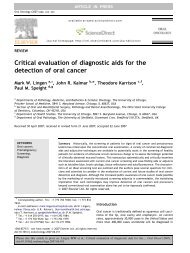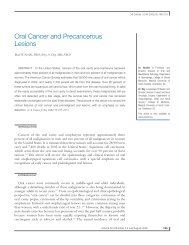Oral medicine â Update for the dental practitioner - Oral Cancer ...
Oral medicine â Update for the dental practitioner - Oral Cancer ...
Oral medicine â Update for the dental practitioner - Oral Cancer ...
You also want an ePaper? Increase the reach of your titles
YUMPU automatically turns print PDFs into web optimized ePapers that Google loves.
PRACTICEManagementAlthough patients have spontaneous healingwithin 10-14 days, treatment is indicated particularlyto reduce fever and control pain. Adequatefluid intake is important, especially inchildren, and antipyretics/analgesics such asparacetamol/acetoaminophen elixir help. Asoft bland diet may be needed, as <strong>the</strong> mouthcan be very sore. Aciclovir orally or parenterallyis useful mainly in immunocompromisedpatients or in <strong>the</strong> o<strong>the</strong>rwise apparently healthypatient if seen early in <strong>the</strong> course of <strong>the</strong> diseasebut does not reduce <strong>the</strong> frequency of subsequentrecurrences.Recurrent HSV infectionsUp to 15% of <strong>the</strong> population have recurrentHSV-1 infections, typically on <strong>the</strong> lips (herpeslabialis: cold sores) from reactivation of HSVlatent in <strong>the</strong> trigeminal ganglion. The virus isshed into saliva, and <strong>the</strong>re may be clinicalrecrudescence. Reactivating factors includefever such as caused by upper respiratory tractinfection (hence herpes labialis is often termed‘cold’ sores), sunlight, menstruation, trauma andimmunosuppression.Lip lesions at <strong>the</strong> mucocutaneous junctionmay be preceded by pain, burning, tingling oritching. Lesions begin as macules that rapidlybecome papular, <strong>the</strong>n vesicular <strong>for</strong> about 48hours, <strong>the</strong>n pustular, and finally scab within 72-96 hours and heal without scarring (Fig. 11).treatment is indicated. Antivirals will achievemaximum benefit only if given early in <strong>the</strong> diseasebut may be indicated in patients who havesevere, widespread or persistent lesions and inimmunocompromised persons. Lip lesions inhealthy patients may be minimised with penciclovir1% cream or aciclovir 5% cream appliedin <strong>the</strong> prodrome. In immunocompromisedpatients, systemic aciclovir or o<strong>the</strong>r antiviralssuch as valaciclovir (<strong>the</strong> precursor of penciclovir)may be needed.Websites and patient in<strong>for</strong>mationhttp://openseason.com/annex/library/cic/X0033_fever.txt.htmlKey points <strong>for</strong> patients: cold sores• These are common• They are caused by a virus (Herpes simplex)which lives in nerves <strong>for</strong>ever• They are infectious and <strong>the</strong> virus can betransmitted by kissing• They may be precipitated by sun-exposure,stress, injury or immune problems• They have no long-term consequences• They may be controlled by antiviral creamsor tablets, best used early onDrug-induced ulcerationDrugs may induce ulcers by producing alocal burn, or by a variety of mechanismssuch as <strong>the</strong> induction of lichenoid lesions(Fig. 12). Cytotoxic drugs (eg methotrexate)commonly produce ulcers, but non-steroidalanti-inflammatory drugs (NSAIDs), alendronate(a bisphosphonate), nicorandil (acardiac drug) and a range of o<strong>the</strong>r drugs mayalso cause ulcers.Fig. 11 Herpes labialisRecurrent intraoral herpes in apparentlyhealthy patients tends to affect <strong>the</strong> hard palateor gingivae with a small crop of ulcers whichheals within one to two weeks. Lesions are usuallyover <strong>the</strong> greater palatine <strong>for</strong>amen, followinga palatal local anaes<strong>the</strong>tic injection, presumablybecause of <strong>the</strong> trauma.Recurrent intraoral herpes in immunocompromisedpatients may appear as chronic, oftendendritic, ulcers, often on <strong>the</strong> tongue.DiagnosisDiagnosis is largely clinical; viral studies areused occasionally.ManagementMost patients will have spontaneous remissionwithin one week to 10 days but <strong>the</strong> condition isboth uncom<strong>for</strong>table and unsightly, and thusFig. 12 Lichenoid reaction to propranololA drug history is important to elicit suchuncommon reactions, and <strong>the</strong>n <strong>the</strong> offendingdrug should be avoided.Patients to refer:• Severe aphthae• Malignancy• HIV-related ulceration• TB or syphilis• Drug-related ulceration• Systemic disease• Mucocutaneous disorders.264 BRITISH DENTAL JOURNAL VOLUME 199 NO. 5 SEPT 10 2005


